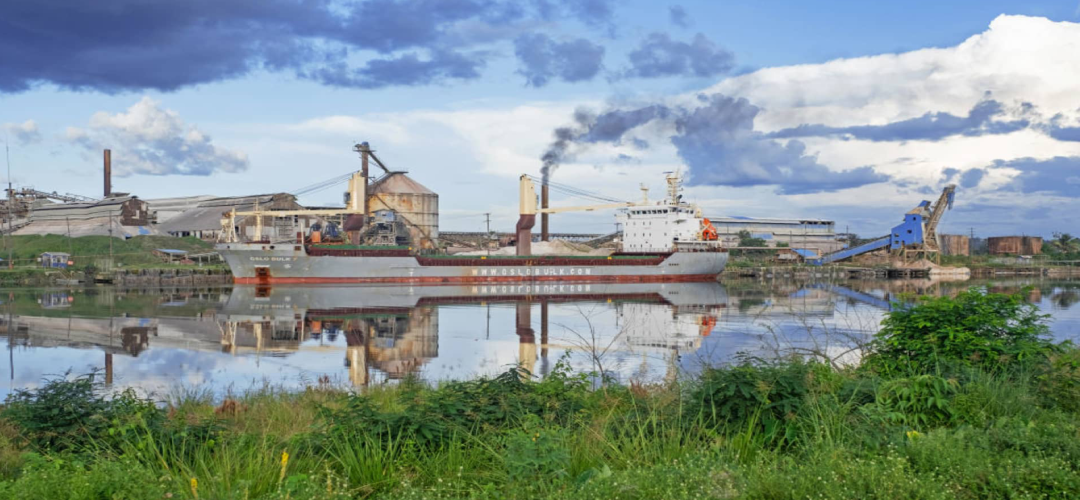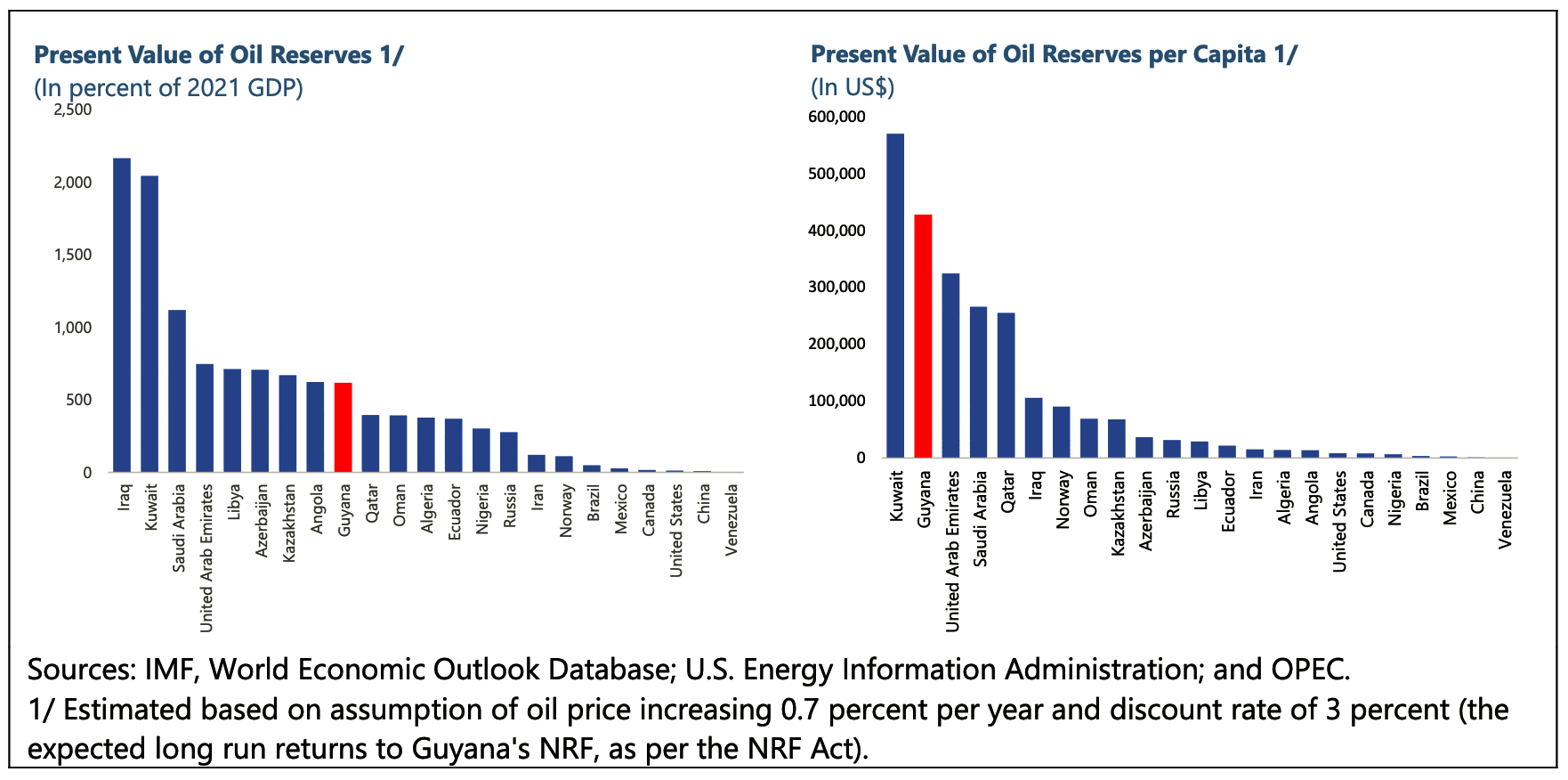A Glimpse Into Guyana
October 7, 2023 | Expert Insights

Guyana, located in the northern part of South America, is bordered by the Atlantic Ocean and has Venezuela on one side, Suriname on another, and Brazil to the South. Once a British colony, it is the only English-speaking nation in South America. One of the least populated countries in the world, it is also the second-least populous sovereign state in South America. Most of the country is covered in tropical rainforest. Although it has plentiful reserves of natural resources like bauxite, gold, and timber, it has struggled to overcome economic problems and advance its economy.
A series of oil discoveries since 2015 have uncovered over 11 billion barrels of oil reserves off the coast of Guyana, propelling it on a new path as it moves to capitalize on its oil resources. How the country will navigate its way through the oil bonanza remains to be seen.
Background
Located near the Amazon River and the Orinoco River, "Guyana" originates from an indigenous word meaning "the land of many waters". Spanish explorer Christopher Columbus sighted the coast of Guyana in 1498. While the Spanish claimed the region between the Orinoco and Amazon deltas, the Dutch first settled in Guyana, establishing trading posts by about 1580. By the mid-1600s, they had started importing slaves from West Africa to serve as labour in sugarcane plantations. In the 18th century, the Dutch and other Europeans expanded their settlements further downstream. During the French Revolutionary and Napoleonic wars from 1792 to 1815 (mostly between the French and the British), Guyana changed hands several times between different powers until the British took over in 1796 and established the colony of British Guiana.
After the slave trade was abolished and full emancipation took place in 1838, plantation owners imported labour, including indentured workers from India. Gold was discovered in 1870, and a gold boom in the 1890s helped the colonial settlers. In 1953, a new constitution was introduced, which provided for universal adult suffrage and an elected legislature. The first elected government, formed by the People's Progressive Party (PPP), seemed pro-Communist, so the British suspended the constitution in 1953 and only restored it in 1957. The PPP split along ethnic lines into a predominantly Indo-Guyanese party (descendants of Indian indentured workers) and an Afro-Guyanese party (African descendants). Bloody riots broke out between Afro-Guyanese and Indo-Guyanese groups in the 1960s, resulting in the return of British troops.
In 1966, Guyana became independent with Forbes Burnham (leading the Afro-Guyanese People's National Congress) as its prime minister. It got a new constitution in 1980, and Burnham became the first President. In 1992, the Indo-Guyanese PPP won the first completely free elections, and Cheddi Jagan (the first leader of the PPP) became President. While Guyana grappled with violent crime and ethnic conflict, the economy began to pick up after years of economic distress. The government invested in agriculture, forestry, offshore oil exploration, and building roads and bridges. In 2011, the PPP lost a majority to a coalition formed by A Partnership for National Unity (APNU) - an alliance of the PNC and smaller parties with the Alliance for Change (AFC) party. In 2015, the APNU-AFC coalition won the national election, and its candidate, General David Granger, became President.
The discovery of a rich oil field in Guyana’s offshore waters in 2015 raised the stakes in its political arena. By 2020, another 17 underwater oil fields had been discovered in the Atlantic waters of Guyana. These oil discoveries and the consequent rising oil production seemed poised to transform the country’s economy.

Analysis
Exxon Mobil, the American multinational oil and gas corporation that discovered this oil amounting to nearly 11 billion barrels of oil, entered into a partnership with Guyana. The APNU-AFC and the PPP were keen to gain control over the new oil industry and the wealth generated by the oil boom. According to the International Monetary Fund (IMF), Guyana's economy grew by 62% last year and is projected to grow by another 37% this year.
In 2018, the APNU-AFC government lost a vote of confidence, one of the reasons being its failure to take prompt measures to regulate the oil industry. A highly contested election in 2020 was eventually resolved in favour of the opposition, the People's Progressive Party and its candidate, Irfaan Ali, became Guyana's first Muslim President.
However, questions prevail over whether the tiny country will be able to manage its oil jackpot. Many developing countries have mined natural resources like oil only to end up with more economic problems, political instability, and weaker democracies in what is economically referred to as the "resource curse". For instance, petroleum has long constituted more than 75 per cent of Venezuela's exports. This high dependence on oil made its economy vulnerable, particularly to plummeting oil prices. Sizeable oil revenues can also lead to increased government corruption and siphoning of public funds.
There are also concerns about the deal with Exxon that provides for a 50-50 split of oil revenues, which is less than the average 75% share that most governments receive. While Exxon contends that Guyana’s low energy infrastructure entails risk, the deal seems dubious and grants a widely expansive lease area to Exxon and substantial control, according to Harvard International Review.
Another issue that Guyana continues to grapple with is ethnic tensions, which fissure its politics and are, in turn, affected by politics. For instance, the PPP's recent victory (by a very narrow margin) has inflamed ethnic tensions as the APNU accuses the PPP of focusing oil wealth on its constituents – the Indo-Guyanese, as opposed to the Afro-Guyanese.
The Afro-Guyanese population is mainly descended from West African ethnicities such as the Ashanti from Ghana, the Yoruba and Ibo from Nigeria, and the Mandingo from Senegal. The majority of the Indo-Guyanese are descendants of indentured workers who migrated from North India, particularly the Bhojpur and Awadh regions (now Uttar Pradesh, Bihar, and Jharkhand). A minority of them are descended from indentured migrants from Tamil Nadu and Andhra Pradesh. While Indo and Afro-Guyanese are the first and second largest ethnic groups, respectively, there are also mixed heritage Guyanese and indigenous groups such as the Arawaks, the Caribs, and the Wai Wai.
As Guyana navigates its oil boom, it also has to consider climate change, which threatens its existence. Guyana is highly vulnerable to coastal floods: 90% of its population lives in low-lying regions along the Atlantic coast, and the capital, Georgetown, is below sea level, cordoned off by seawalls to keep the ocean at bay. Further, deep-water offshore drilling comes with the risk of oil spills, which could severely damage the biodiversity of a country with 85% rainforest cover, in turn affecting its economy, such as its fishing industry. However, oil profits could fund the reconstruction and expansion of seawalls and contribute to measures supporting farmers affected by major flooding.
Assessment
- Despite the risks that come with an oil boom, Guyana is intent on its oil future. While the Guyanese can hardly be expected to say no to burgeoning oil profits, the government would have to find suitable ways to channel the oil revenue. It would also have to ensure the appropriate distribution of oil wealth so that it does not exacerbate ethnic tensions, particularly in light of the political split along ethnic lines.
- To contribute to long-term economic resilience, prevent the oil boom from destabilizing its economy, and improve the quality of life for people, it could invest oil profits in long-term social and economic infrastructure like healthcare, education, and roads. It could also set up a sovereign wealth fund to invest diversely and encourage sustainable growth independent of oil. For instance, Norway’s huge sovereign wealth fund (the Oil Fund) finances one of the best social security systems in the world, invests diversely, and has fiscal limits on spending.
- Given Guyana's vulnerability to climate change, it could also look at reinvesting oil profits in measures that mitigate environmental impact.








Comments